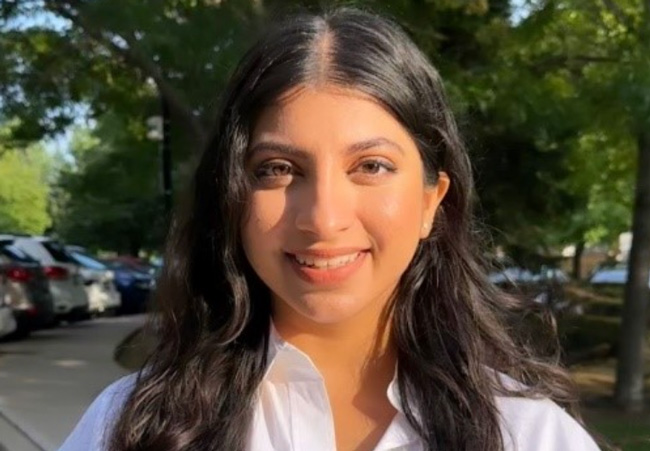
During her time at Yorkville University, Amreen Saini consistently embodied the notion that “(student) life is what you make of it” – a sentiment she’s now carrying over to her life as a alumnus.
The Master of Arts in Counselling Psychology graduate, who served as Yorkville’s very first Student Council President for the Faculty of Behavioural Sciences during her studies, was recently named Graduation Speaker at the university’s upcoming convocation ceremony in Fredericton, New Brunswick.
“Though I have a background in life sciences, I have always been fascinated by the field of Psychology. Within the first few weeks of Yorkville classes, I was certain that this was the right career for me,” she said of the enthusiasm with which she embraced her new path.
“Each course encouraged me to build my professional skillset, reflect on my unique worldviews, and treat challenges as invaluable growth opportunities.”
Now that she’s completed her master’s degree with Yorkville, Saini said she’ll be carrying the knowledge and insights passed onto her from her professors and peers along with her as she “enthusiastically” continues her journey to becoming a successful psychotherapist.
Saini recently sat down to reflect on her time at Yorkville University and her plans for the future. Here’s what she had to say:
What brought you to Yorkville University? Where were you in your life/career when you decided to continue your studies with us?
I completed my Bachelor of Science degree from McMaster University in June 2020 and was exploring postgraduate studies in the upcoming year or so. After much introspection during the pandemic, I came to realize that my career would involve psychology in some way, shape or form. Hence, I was at a pretty uncertain point in my life, where several different avenues were open to me, but ultimately, it was the step towards MACP that felt like a step in the right direction.
What made you decide to pursue your Master of Arts in Counselling Psychology?
Being a Life Sciences student, I was relentless in my pursuit of medical school programs – until I realized that I would only really consider becoming a psychiatrist. What I truly wanted was a career in which my three favourite fields – psychology, philosophy, and spirituality – could intersect seamlessly and maintain my interest, given the vastness of their content. Shortly after completing my undergraduate studies, I began browsing master’s programs and came across the MACP. Its academic rigor, flexible course offerings, and experiential learning component prompted my application. The MACP program would allow me to determine whether or not this was my true calling. Seeing as how these 2.5 years flew by and served as an invaluable experience, it’s safe to say, I responded to the right call.
What is the most important thing you’re taking away from your studies at Yorkville University?
My primary takeaway from my time at Yorkville University is the importance of being curious and open-minded. Whether it be expanding your knowledge in regard to academics, working from a holistic perspective when it comes to clients, networking with new colleagues and professors at the start of each course, or embracing student opportunities by participating in clubs and discussions. Transforming my fear of the new and unknown into positive anticipation was a gamechanger. Thinking “I wonder what this will entail” has allowed me to experience so much joy, embody a growth mindset, and build self-confidence.
What are your plans after graduation, both immediate and long term?
After graduating from the MACP program, I will be working full-time at my practicum site: Tara Watson Psychotherapy. In the near future, I will open a private practice within Ontario, where I can support my clients through a holistic and multiculturally informed approach. I would also love to get involved in local and international conferences, and advocate for interdisciplinary initiatives in the mental health field.
If you offered one piece of advice to an incoming student, what would that be?
Every situation presents us with a learning opportunity. Good grades are certainly important, however, what we take away from our subpar performances is equally insightful. The former reassures us of our capabilities, while the latter provides us with space for growth. If we capitalize on our strong suits and intentionally explore our shortcomings, our full potential falls within reach.
Essentially, embrace it all – the good, the bad, and everything in between.






